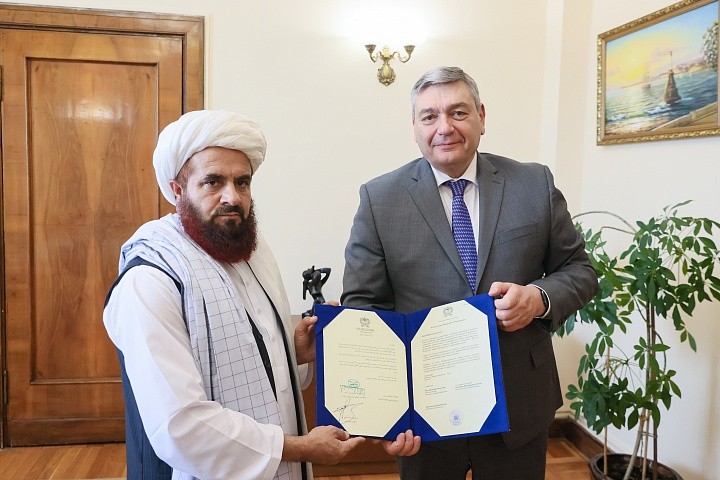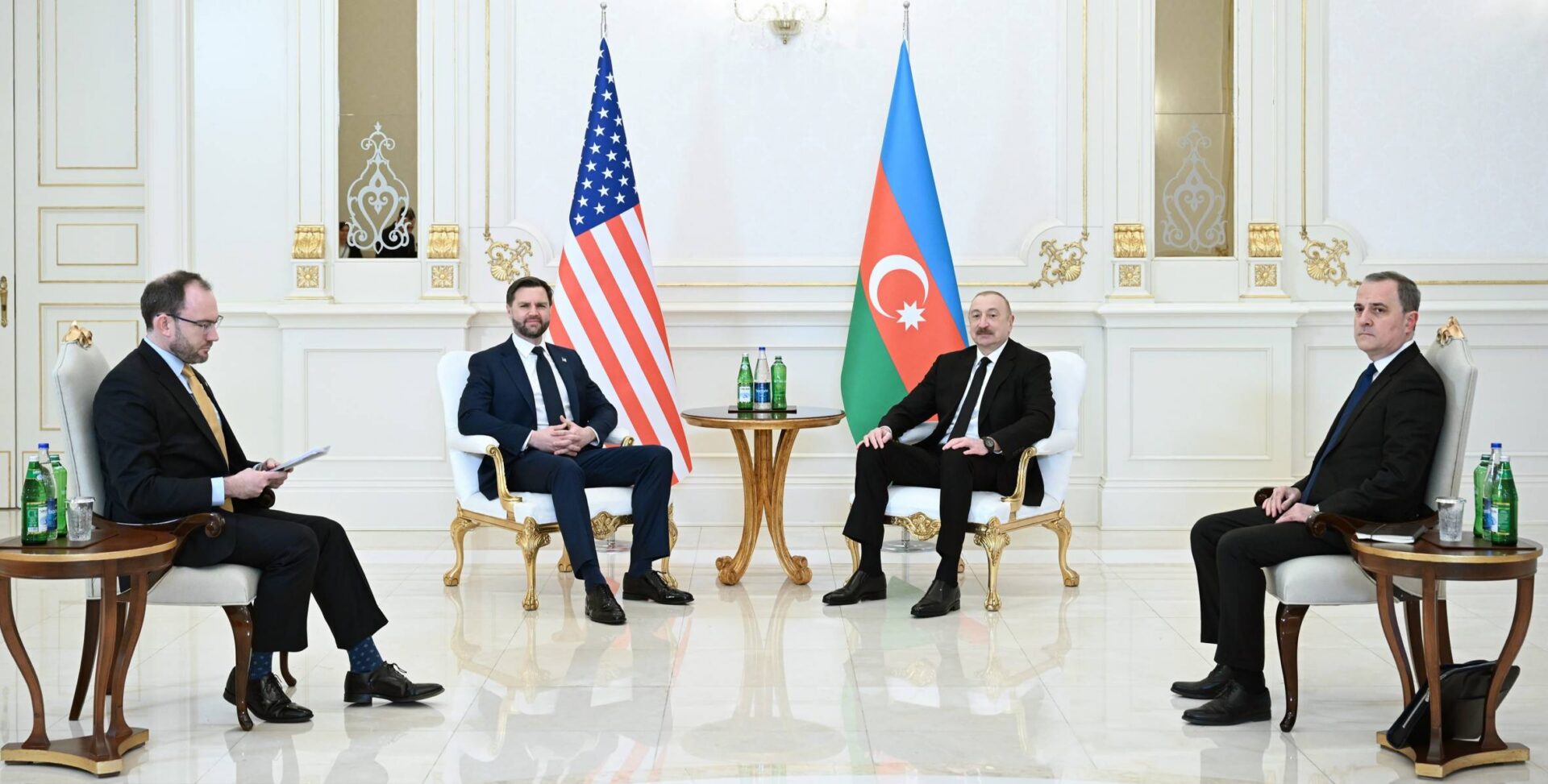
Moscow Formally Recognizes Taliban Government in Afghanistan
Moscow Formally Recognizes Taliban Government in Afghanistan
Executive Summary
- Russia became the first country to formally recognize the Taliban government in Kabul. Moscow has rationalized the move as a pragmatic concession in the fight against drug trafficking and emerging terrorist threats.
- While in some ways purely symbolic, the Kremlin’s decision is rooted in regional security concerns, centered on the spread of the Islamic State–Khorasan Province, which threatens the completion of several north-south connectivity projects.
- The globally isolated Taliban regime hopes that Moscow’s recognition will strengthen the legitimacy of its government while opening the way for Kabul to become a more central player in regional transit and counterterrorism operations.
On July 3, Moscow accepted the credentials of Taliban ambassador Gul Hasan, an act that confers formal recognition of the Taliban as Afghanistan’s legitimate government. This makes Russia the first country to formally recognize the de facto Taliban regime. Hasan arrived in Moscow on July 1, where Russian Deputy Foreign Minister Andrey Rudenko received his diplomatic credentials (Russian Ministry of Foreign Affairs; TASS; Pravda.ru, July 3). Dmitry Zhirnov, the Russian ambassador to Kabul, stated that this decision “demonstrates Russia’s sincere desire to establish a full-fledged partnership with Afghanistan … More than 100 years ago, our country was also the first in the world to recognize the independence of Afghanistan” (TASS, July 3).
The Kremlin’s recognition of the Taliban government comes after years of steadily normalizing relations with Kabul (see EDM, November 13, 2024, June 25). Russia’s interests are driven by security and transit concerns, as Moscow’s war against Ukraine has diminished its dominance over regional trade routes. The Kremlin believes the Taliban regime will play a crucial role in the development of north-south transit corridors that extend from Russia’s Northern Sea Route to the Indian Ocean (see EDM, January 15, June 25).
Moscow designated the Taliban as a terrorist organization in 2003. The Kremlin, however, began improving relations with the Islamist group when it regained power in August 2021 following the withdrawal of U.S. forces (see EDM, November 13, 2024). Russia has maintained its embassy in Kabul since then with the intention of expanding bilateral relations (TASS, August 15, 2021). On April 17, the Russian Supreme Court removed the Taliban from the country’s designated list of terrorist organizations (The Moscow Times, April 17). An official press release from the Russian Foreign Ministry stated:
The removal of terrorist status from the Taliban movement … opens the way to the establishment of a full-fledged partnership with Kabul in the interests of Russian and Afghan peoples … Russia appreciates the military and law enforcement operations conducted by Afghanistan’s authorities in its territory against Wilayat Khorasan, an Afghan wing of ISIS, which professes an ultra-radical ideology of a ‘global juhad [sic]’ (Russian Ministry of Foreign Affairs, April 17).
Zamir Kabulov, the Russian presidential envoy to Afghanistan, has argued that Moscow’s recognition of the Taliban regime is justified due to Kabul’s cooperation in combating terrorism and drug trafficking. In early July, the Russian official declared:
Afghanistan is important in the sense that we have well-known concerns about terrorism that used to originate from Afghanistan … There is also the issue of drug trafficking. Since we found out that the current regime is doing its best to cope with this problem, it became important to maintain a close partnership with the government of Afghanistan (TOLO News, July 5).
The Kremlin is concerned with emerging regional terrorist threats and the security of projects that could become part of the International North-South Transport Corridor (INSTC). Russia fully supports the Taliban’s “counterterrorism operations” against Islamic State–Khorasan Province (ISKP), which claimed responsibility for last year’s attack on the Crocus City Concert Hall near Moscow that killed more than 150 people (see EDM, April 14, 2023, March 26, 28, May 6, July 29, November 13, 2024). The Kremlin already declared the Taliban an ally in counterterrorism efforts last year. In October 2024, Alexander Bortnikov, director of the Russian Federal Security Service (FSB), said, “The Taliban is ready to fight the most dangerous wing of the Islamic State, ISIS-K [or ISKP], which is still getting material support from the West which uses the terrorist group’s capacity to carry out subversive false-flag operations on our soil” (TASS, October 4, 2024). Normalization of relations with the Taliban is a central part of the Kremlin’s strategy to strengthen multilateral efforts aimed at ridding the region of ISKP and other terrorist threats.
Russia and the Central Asian countries are working with the Taliban to improve Afghanistan’s security situation, as that is considered one of the main impediments to regional transit projects (see EDM, June 11, 25, July 7, 8). Moscow’s war against Ukraine has diminished its influence over regional trade, especially in Central and South Asia. Afghanistan’s geographical location between the two regions positions it at the center of any major connectivity and infrastructure projects. The Kremlin hopes that formal recognition of the Taliban government will place Afghanistan firmly in its so-called “sphere of influence.” In the same April press release, the Russian Foreign Ministry stated, “Moscow intends to put special emphasis on building up trade, business, and investment relations with Kabul. Afghanistan, with its unique geostrategic location, might become a link in implementing large-scale energy and infrastructure projects” (Russian Ministry of Foreign Affairs, April 17).
Some regional experts see Russia’s recognition of Taliban rule as largely symbolic. Ruslan Suleymanov, an expert on Central Asia at the Carnegie Endowment for International Peace, believes that Moscow’s move is unlikely to significantly alter the current state of bilateral affairs. He asserts, “Recognition of the Islamic Emirate of Afghanistan is … no more than a symbolic gesture, underscoring the friendly nature of relations between Moscow and Kabul at a time when the Kremlin is losing allies on the international stage” (The Moscow Times, July 4). Afghan analysts, however, argue that Russia’s move will enhance the political legitimacy of the Taliban regime, and “gradually, other Eastern countries will also recognize Afghanistan and its Islamic government” (TOLO News, July 5). Suhail Shaheen, Kabul’s ambassador to Qatar, hopes that “like-minded” countries will follow Moscow’s lead.
Russia’s recognition serves the interests of both the Kremlin and the Taliban. While Moscow needs Kabul to counter regional terrorist threats and open the way for critical connectivity projects, the de facto Taliban government needs formal recognition and support to overcome domestic challenges that stem from extensive sanctions and global isolation.


